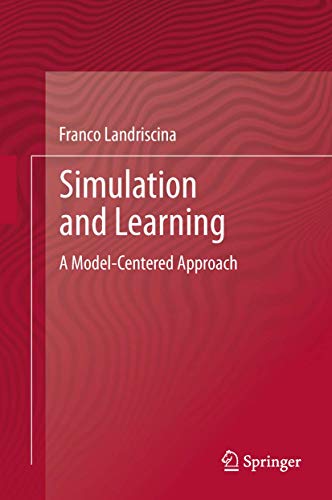
Sinopsis
The main idea of this book is that to comprehend the instructional potential of simulation and to design effective simulation-based learning environments, one has to consider both what happens inside the computer and inside the students’ minds. The framework adopted to do this is model-centered learning, in which simulation is seen as particularly effective when learning requires a restructuring of the individual mental models of the students, as in conceptual change. Mental models are by themeselves simulations, and thus simulation models can extend our biological capacity to carry out simulative reasoning. For this reason, recent approaches in cognitive science like embodied cognition and the extended mind hypothesis are also considered in the book.. A conceptual model called the "epistemic simulation cycle" is proposed as a blueprint for the comprehension of the cognitive activies involved in simulation-based learning and for instructional design.
"Sinopsis" puede pertenecer a otra edición de este libro.
De la contraportada
This book conveys the incredible instructional potential of simulation as a modality of education and provides guidelines for the design of effective simulation-based learning environments. The framework of the book consists of model-centered learning---learning that requires a restructuring of individual mental models utilized by both students and teachers.
Simulation models extend our biological capacity to carry out simulative reasoning. Recent approaches to mental modeling, such as embodied cognition and the extended mind hypothesis are also considered in the book, which relies heavily on recent advances in cognitive science.
A conceptual model called the epistemic simulation cycle is proposed as a blueprint for the comprehension of the cognitive activities involved in simulation-based learning and for instructional design.
"Sobre este título" puede pertenecer a otra edición de este libro.
Otras ediciones populares con el mismo título
Resultados de la búsqueda para Simulation and Learning: A Model-Centered Approach
Landriscina:Simulation and Learning (eng)
Impresión bajo demandaLibrería: Brook Bookstore On Demand, Napoli, NA, Italia
Condición: new. Questo è un articolo print on demand. Nº de ref. del artículo: 8560c29163619511046db0521a027ec1
Comprar nuevo
Cantidad disponible: Más de 20 disponibles
Simulation and Learning: A Model-Centered Approach
Librería: Lucky's Textbooks, Dallas, TX, Estados Unidos de America
Condición: New. Nº de ref. del artículo: ABLIING23Mar2716030035476
Comprar nuevo
Cantidad disponible: Más de 20 disponibles
Simulation and Learning : A Model-Centered Approach
Librería: GreatBookPrices, Columbia, MD, Estados Unidos de America
Condición: New. Nº de ref. del artículo: 14215356-n
Comprar nuevo
Cantidad disponible: 15 disponibles
Simulation and Learning: A Model-Centered Approach
Librería: Ria Christie Collections, Uxbridge, Reino Unido
Condición: New. In. Nº de ref. del artículo: ria9781461419532_new
Comprar nuevo
Cantidad disponible: Más de 20 disponibles
Simulation and Learning : A Model-Centered Approach
Librería: GreatBookPricesUK, Woodford Green, Reino Unido
Condición: New. Nº de ref. del artículo: 14215356-n
Comprar nuevo
Cantidad disponible: Más de 20 disponibles
Simulation and Learning
Librería: BuchWeltWeit Ludwig Meier e.K., Bergisch Gladbach, Alemania
Buch. Condición: Neu. This item is printed on demand - it takes 3-4 days longer - Neuware -The main idea of this book is that to comprehend the instructional potential of simulation and to design effective simulation-based learning environments, one has to consider both what happens inside the computer and inside the students' minds. The framework adopted to do this is model-centered learning, in which simulation is seen as particularly effective when learning requires a restructuring of the individual mental models of the students, as in conceptual change. Mental models are by themeselves simulations, and thus simulation models can extend our biological capacity to carry out simulative reasoning. For this reason, recent approaches in cognitive science like embodied cognition and the extended mind hypothesis are also considered in the book. A conceptual model called the 'epistemic simulation cycle' is proposed as a blueprint for the comprehension of the cognitive activies involved in simulation-based learning and for instructional design. 256 pp. Englisch, Italienisch. Nº de ref. del artículo: 9781461419532
Comprar nuevo
Cantidad disponible: 2 disponibles
Simulation and Learning
Impresión bajo demandaLibrería: moluna, Greven, Alemania
Gebunden. Condición: New. Dieser Artikel ist ein Print on Demand Artikel und wird nach Ihrer Bestellung fuer Sie gedruckt. Emphasizes the connection between simulation and mental process Provides in-depth analysis of the relationships between simulation and mental models Demonstrates ways that simulation can be used support conceptual change Connects sim. Nº de ref. del artículo: 4197293
Comprar nuevo
Cantidad disponible: Más de 20 disponibles
Simulation and Learning
Librería: THE SAINT BOOKSTORE, Southport, Reino Unido
Hardback. Condición: New. This item is printed on demand. New copy - Usually dispatched within 5-9 working days 529. Nº de ref. del artículo: C9781461419532
Comprar nuevo
Cantidad disponible: Más de 20 disponibles
Simulation and Learning | A Model-Centered Approach
Impresión bajo demandaLibrería: preigu, Osnabrück, Alemania
Buch. Condición: Neu. Simulation and Learning | A Model-Centered Approach | Franco Landriscina | Buch | xvii | Englisch | 2013 | Springer US | EAN 9781461419532 | Verantwortliche Person für die EU: Springer Verlag GmbH, Tiergartenstr. 17, 69121 Heidelberg, juergen[dot]hartmann[at]springer[dot]com | Anbieter: preigu Print on Demand. Nº de ref. del artículo: 106780747
Comprar nuevo
Cantidad disponible: 5 disponibles
Simulation and Learning: A Model-Centered Approach (English and Italian Edition)
Librería: Revaluation Books, Exeter, Reino Unido
Hardcover. Condición: Brand New. 1st blg edition. 250 pages. 9.50x6.50x0.50 inches. In Stock. Nº de ref. del artículo: x-1461419530
Comprar nuevo
Cantidad disponible: 2 disponibles

